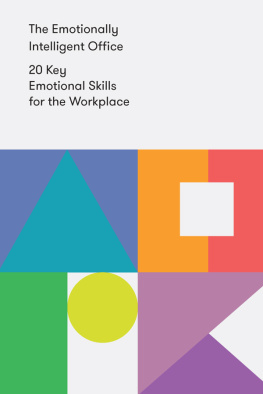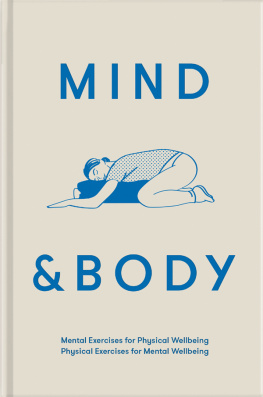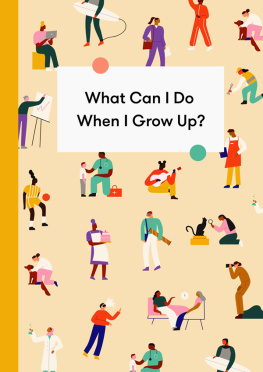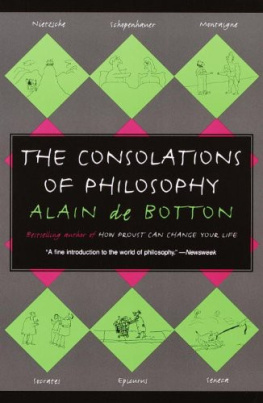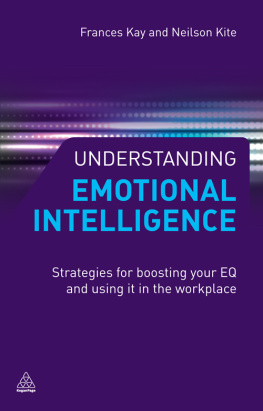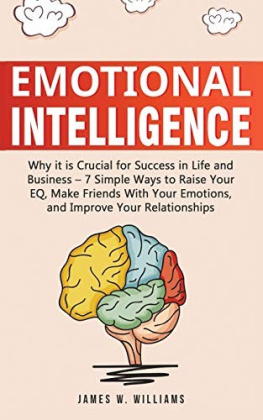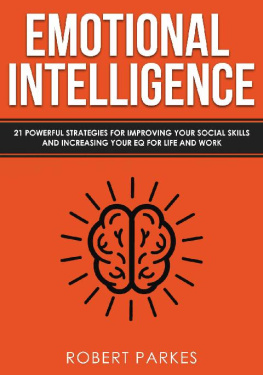Contents
Guide
The Emotionally
Intelligent Office
20 Key
Emotional Skills
for the Workplace
The Emotionally
Intelligent Office
20 Key
Emotional Skills
for the Workplace
The School of Life
Published in 2018 by The School of Life
70 Marchmont Street, London WC1N 1AB
Copyright The School of Life 2018
Designed and typeset by Marcia Mihotich
Printed in Belgium by Graphius
All rights reserved. This book is sold subject to the condition that it shall not be resold, lent, hired out or otherwise circulated without express prior consent of the publisher.
A proportion of this book has appeared online at thebookoflife.org
Every effort has been made to contact the copyright holders of the material reproduced in this book. If any have been inadvertently overlooked, the publisher will be pleased to make restitution at the earliest opportunity.
The School of Life offers programmes, publications and services to assist modern individuals in their quest to live more engaged and meaningful lives. Weve also developed a collection of content-rich, design-led retail products to promote useful insights and ideas from culture.
www.theschooloflife.com
ISBN 978-1-9128910-9-2
10 9 8 7 6 5 4 3 2 1
Contents

A good business education teaches us a host of vital skills: how to navigate a balance sheet, analyse competitors, negotiate contracts, market and sell. But when we reach the office, we may be confronted by other, less familiar, kinds of challenges: the person at the desk opposite us with the charming manner who enthusiastically agrees with whomever theyre speaking to yet harbours a range of toxic reservations and privately pursues their own unstated agenda; the person who responds to polite criticism or well-meaning feedback with immediate hurt and fury; the person who follows orders dutifully but cannot generate an original vision or initiative; the person who manifests a rivalrous and factional nature
In days gone by, when work only required people to turn a boat swiftly starboard, push coal trolleys up a hill, or increase the rate of production at a blast furnace, psychological dynamics were of negligible economic importance or interest. A worker could feel underappreciated, bullied and belittled and still perform their role perfectly. Even when they hated the supervisor and there were communication issues in the team, they could operate the brick making machine at optimal speed. If the head gardener had a macho streak, the men watering in the greenhouses or pruning in the orchard could not imagine they would work for anyone much better. Emotional distress could be ignored.
Yet many of us now labour with our minds (and souls) far more than with our bodies. Our work requires from us continuous interaction, creativity, personal service and intellectual concentration, and is therefore susceptible to the prevailing emotional atmosphere. The quality of our efforts has grown reliant on tricky, elusive fare: a sense of meaning, respect, inner fulfilment, encouragement and a spirit close to friendship. A wounding comment or curt interaction may ruin the productive potential of an afternoon. Profitability has grown reliant on feelings.
So peculiar and awkward is this phenomenon, it is tempting to deny that it might even exist. It would be much easier if workers could remain at all times professional that is, logical, efficient, straightforward, insensitive to mild insult, responsive to brute command and uninclined to mental breakdown. We are under pressure to forget the difficult truth that we know from personal life: that humans are exhaustingly complex, unpredictable and fragile.
Our desire to assume that the workplace is emotionally simpler than it really is has been partly sustained by its long-standing neglect at the hands of culture. Films, novels and art dealing with the emotional aspects of office life have been in a minority, and this gap has hampered our ability to understand the significance of our real experiences at work.
For the last two hundred years, the meaning of our lives has been tightly connected with love and work, yet the arts have been very selective about which of these two ideals they have looked at. They have engaged intimately with love, charting its key moments and giving us a language with which to explore its yearnings and griefs. Conversely, work has been almost entirely ignored.
If a visiting Martian were asked to assess human priorities on the evidence of the plots of novels alone, it might be astonished to learn that humans do not spend all their time falling in and out of love (and occasionally murdering one another), but devote a predominant share of their energies to going to the office. Precious little of the reality of our lives at work makes it onto the page or screen, the stated reason being that it would be boring; the deeper reason being that it requires an uncommon amount of genius to tease out the latent interest and drama of workplace dynamics. But we collectively pay a price for this silence: without art, our feelings go by unattended and we lack a sufficiently rich language with which to interpret ourselves.
Insofar as culture has taken us to work, it has been to the studio, and to the excitements and sorrows of the creative artist, about which we know a great deal. In the 19th century, the studio became the quintessential image of the place of work, often characterised by sloping ceilings, large windows, a view over neighbouring rooftops, sparse furniture, the smell of turpentine, messy tables covered in tubes of paint and half-finished masterpieces propped against the walls. There was an additional factor that particularly enticed the collective imagination: the studio was a place of solitude. Here the artist could carry out projects without asking anyones permission or approval. He or she was free of one of the greatest sources of agitation of modern life: other people.
Our cultural representation of work has taken us perilously far from a just appreciation and understanding of what we ourselves are most likely to face in our jobs. We are constantly invited to read interviews with singers and novelists, but we seldom eavesdrop on the tensions inside teams of warehouse support staff responsible for the distribution of homeware products. Therefore, we fail to develop an appropriate sympathy for the skills and qualities of mind that will help to make our collaborations tolerable and successful.
Depictions of working life in the 19th century often included an idealised view of the artist working in glorious solitude.
__Carl Friedrich H. Werner, The Artists Studio, Venice, 1855.

In relation to artistic work, we have been carefully educated as to some of the challenges involved in creating finished products by the prestige accorded to artists sketches. These show us the prevarications, false starts and sheer resilience routinely exacted by art. This has implicitly taught us to relinquish impatience and unhelpful perfectionism when we in turn sit down to create.
However, we lack the equivalent of a sketch for most working lives. We encounter the fruits of non-artistic labour without the surrounding stories and images of their genesis. We look at a pristine piece of technology, a contract, a car or a holiday company without learning of the background agonies that went into its creation: the late nights, the stubborn boss, the indecisive sales director, the rivalries and setbacks. Therefore, when we hit difficulties in our working lives, were inclined to panic and believe that something has gone particularly wrong for us.

